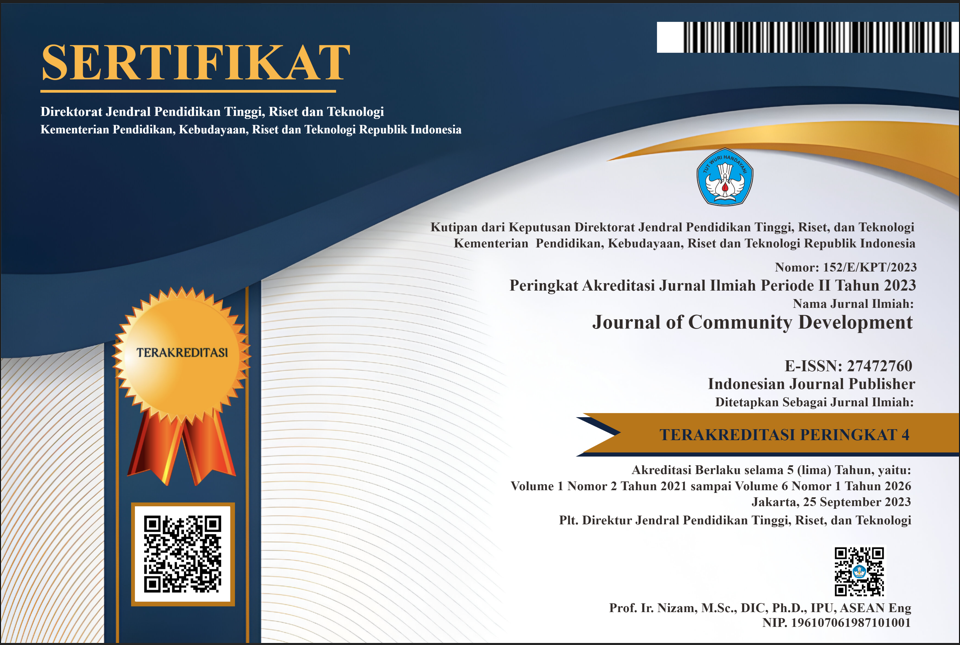Pelatihan Pembelajaran Biologi Interaktif Untuk Guru Sekolah Pedesaan
DOI:
https://doi.org/10.47134/comdev.v3i3.1487Keywords:
Biology learning training, interactive learning, rural school teacherAbstract
Interactive Biology learning training for rural school teachers aims to improve the quality of teaching by utilizing learning methods that actively involve students, despite the limited resources available. This study uses a qualitative approach with phenomenological design to explore the teacher's experience and perception of the training. Data were collected through in-depth interviews, classroom observations, and documentation. The results showed that this training has a positive impact on improving the knowledge and skills of teachers in implementing interactive Biology learning. Teachers feel more confident in using simple teaching aids and environment-based experiments as a learning medium. However, the main challenge faced is the limited facilities and teaching aids in rural schools. In addition, despite the increase in student activity, teachers also face difficulties in managing the diversity of student interests and abilities. Overall, the training improves the quality of teaching in rural schools and provides practical guidance to address existing challenges. This research suggests that continuous training should be conducted and focus on practical solutions related to limited resources
Downloads
References
Arends, R. I. (2014). Learning to Teach (10th ed.). McGraw-Hill Education.
A R. Miles and M. A. Huberman, Qualitative Data Analysis: A Methods Sourcebook, 3rd ed., Thousand Oaks, CA: Sage Publications, 2014.
Bransford, J. D., Brown, A. L., & Cocking, R. R. (2000). How People Learn: Brain, Mind, Experience, and School. National Academy Press.
C. S. Patton, Qualitative Research and Evaluation Methods, 4th ed., Thousand Oaks, CA: Sage Publications, 2015.
Duran, D., Lupu, D., & Sandu, A. (2014). The Role of the Natural Environment in Science Education. Journal of Educational Sciences & Psychology, 14(2), 50-58.
Darling-Hammond, L., Hyler, M. E., & Gardner, M. (2017). Effective Teacher Professional Development. Learning Policy Institute.
Guskey, T. R. (2000). Evaluating Professional Development. Corwin Press.
Girsang, S. E. E., Kurniawan, A., Sarjana, S., Akbar, M. A., Lotulung, C. V., Rafid, R., ... & Nawawi, I. (2022). Konsep Inovasi Pendidikan. Get Press Indonesia.
J. A. Wulandari, "Peran Guru dalam Meningkatkan Kualitas Pendidikan di Daerah Terpencil," Jurnal Pendidikan Indonesia, vol. 12, no. 4, pp. 201-208, 2018
M. B. Creswell, Qualitative Inquiry and Research Design: Choosing Among Five Approaches, 4th ed., Thousand Oaks, CA: Sage Publications, 2017.
M. T. Fitri, "Peningkatan Kualitas Pendidikan di Sekolah Pedesaan: Pendekatan Pembelajaran Aktif," Jurnal Pendidikan dan Pengajaran, vol. 6, no. 1, pp. 65-74, 2020.
R. S. Pratama, "Implementasi Pembelajaran Biologi Berbasis Teknologi di Sekolah Pedesaan," Jurnal Teknologi Pendidikan, vol. 11, no. 3, pp. 123-130, 2021.
Rafid, R., & Khotimah, F. K. (2021). Interaction analysis on social-education of Indonesian school students: A literacy activity. Journal of Social, Humanity, and Education, 1(4), 269-280.
S. H. Amin, "Pengaruh Pembelajaran Interaktif terhadap Hasil Belajar Siswa," Jurnal Pendidikan Biologi, vol. 10, no. 2, pp. 45-53, 2019.
Downloads
Published
How to Cite
Issue
Section
License
Copyright (c) 2023 Muhammad Zainul Amin, Sri Rahmawati, Rahmad Rafid, Rosidi Azis, Aprianus Adi

This work is licensed under a Creative Commons Attribution 4.0 International License.







